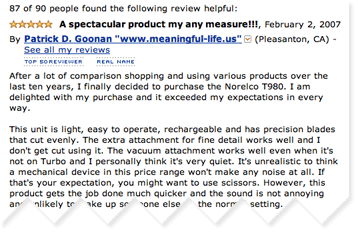Flipping through ma tweets, I found this one from Jeffrey Zeldman (which I presume came from Jared Spool at An Event Apart Seattle):
1 in 1,300 purchasers writes a review. With a standard 2 percent conversion rate, you need 3 million visitors a day to get useful reviews.
Reading that made me think about how I almost never write reviews, especially for products. The only times I do write reviews is when I have something to gain.
 For others, respect provides enough motivation, which is why Amazon implemented badges. Having 'Real Name' and 'Top 500 Reviewer' beside your username commands some respect and ensures authenticity. This is really helpful for those seeking reviews, but not for most who should be writing them.
For others, respect provides enough motivation, which is why Amazon implemented badges. Having 'Real Name' and 'Top 500 Reviewer' beside your username commands some respect and ensures authenticity. This is really helpful for those seeking reviews, but not for most who should be writing them.
Currently, there is not much for me to gain by writing reviews on Amazon. My friends run in other circles and there's just not enough time in the day. Now, if there was a financial motivation, this would be another story.
Amazon Reviewing Associates
Amazon runs a successful referral program that allows you to generate money when people buy products from your links. I don't have any numbers to back this up, but it's safe to assume that the money Amazon loses in referral fees are made up in a reduced advertising and marketing budget. My dad, a car dealer, used to say it takes $250 just to get someone in the door. Amazon's number is probably significantly less, but they also have significantly more customers.
If driving traffic to content is this valuable, shouldn't accurate reviews of a product be rewarded as well? Getting a customer in the door is an important step, but closing the sale is just as crucial.
I propose that Amazon rewards users whose reviews are deemed most helpful and the people who find those reviews first. Mr. Spool, the man who inspired the tweet above, made the case that helpful reviews account for $2.7 billion in revenue. Even if this is high, it's obviously in Amazon's best interest to encourage these.
If I could make $5-10 a month writing reviews for Amazon products, I'd be writing a whole lot more of them. Even if that number petered out after a while, I'd likely still continue once I got in the swing of things. In fact, it seems that an outside company could make money with their own recommendation engine using this system. If they were to share the referral rewards and place some subtle ads, there'd probably be a pretty good business.
The thing I like best about this idea is that everybody wins. Amazon sells more products, active community members get rewarded and I'm more likely to buy the best beard trimmer.
05/05/09 12:06 PM
The downside to your plan is that paying people money to write reviews means it would give millions of people an incentive to just post as many reviews as possible, obviously at some point for things they've never owned, used, or even touched before.
It would drive the value of each review down significantly and introduce a ton of noise in the system.
I can see why Amazon doesn't incentivize reviews -- they want people that love stuff so much they'd write a free review.